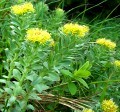Spliced feed for The Science Network |
| PAST BLAST: Germ on Germ Action [SciScoop Science Blog] Posted: |
| Rhodiola rosea [Sciencebase Science Blog] Posted: 22 Oct 2008 07:00 AM CDT
The Wiki entry for R rosea says it may be effective for improving mood and alleviating depression and early stage studies on people have shown some efficacy in improving physical and mental performance, alleviating fatigue, and reducing high-altitude sickness. A possible mode of action involves what the entry describes as, “optimizing serotonin and dopamine levels”. This apparently happens by inhibition of the enzyme monoamine oxidase, which supposedly ties in with an effect on endorphins, the body’s natural opiates. However, this is pure speculation rather than having basis in published scientific studies. According to the latest press release I received today, R rosea is a remarkable story, the story of how a traditional herbal remedy from Sweden became the force behind Soviet Olympic athletes and cosmonauts. The Swedish Herbal Institute has even done what the email claims is “hard” research, unusually for a herbal product, in the form of double-blind, placebo-controlled, randomized clinical trials. The SHI holds a trademark on an extract of R rosea, referring to it as Arctic Root (SHR-5). So, their research is not without designs on the herbal remedies market. It is also sold in the US as ADAPT 232. The press release highlights a previously published article by a science journalist and says that, “the roots appear to aid the brain by alertness and energy, without any trace of stimulants such as caffeine.” I find that phrase a little irritating. If the root has efficacy in stimulating the brain, then by definition it is a stimulant. It is irrelevant that it does not contain caffeine, why should it, there are dozens of natural products that act as stimulants that aren’t caffeine? I asked the author of the press release, Linda Todten of publicity company TMC Communications, to explain exactly what the description was intended to convey, this is what she had to say: As you know, the trend is for “energy drinks” that combine large amounts of caffeine, or caffeine containing plants such as Guarana, along with high amounts of carbs for a big “energy boost.” The studies that the Swedes and Russians have done over the years have shown how this category of plant, the Adaptogen, can actually bring the body back to its full energy level without being over stimulated as happens with caffeine. Plus, the extract SHR-5 has been shown to have a very solid mental acuity boost via double-blind, placebo controlled studies in students or night shift physicians and others. So, this plant is an adaptogen, by definition “one that has no ill effects on the body at all - no interaction with pharmaceuticals - and yet which appear to have a normalizing influence on the body and brain.” I’m afraid that sounds like wishful thinking to me. Previously, adaptogens were known as rejuvenating herbs, qi tonics, rasayanas, or restoratives, which sounds like a product of the Victorian sanitorium era or a dubious backstreet apothecary? Any product that has an apparently direct influence on brain enzymes, or enzymes anywhere else in the body for that matter, is not going to be without side-effects. Our bodies are far too complicated for that. It would be an More to the point, the plant root contains a variety of natural products including rosavin, rosarin, rosin and salidroside (and sometimes p-tyrosol, rhodioniside, rhodiolin and rosiridin), which are claimed to be the active ingredients of R rosea. These compounds are polyphenols, they may have some antioxidant activity but have no proven health benefits in humans. I realise, of course, that people can become desperate, especially when they or their loved ones are suffering, but simple herbs with Well, actually, that says to me that the herbal marketeers (do they call themselves adaptogenicists yet? Or Adaptopaths perhaps?) are very good at marketing and must be jumping for joy all the way to the bank as consumers unaware of the fundamentals of biochemistry lap up this abundant weed in the hope of boosting their brains, staying fit, and living longer. |
| King crabs poised to invade Antarctic waters [Earth & Sky Podcast] Posted: 22 Oct 2008 04:10 AM CDT Marine scientist Rich Aranson says that our warming climate will allow king crabs to invade shallow Antarctic waters, where they’ll gobble up vast numbers of soft-shelled creatures. “The world will be a less rich place as this happens,” he said. This posting includes an audio/video/photo media file: Download Now |
| You are subscribed to email updates from The Science Network To stop receiving these emails, you may unsubscribe now. | Email Delivery powered by FeedBurner |
| Inbox too full? | |
| If you prefer to unsubscribe via postal mail, write to: The Science Network, c/o FeedBurner, 20 W Kinzie, 9th Floor, Chicago IL USA 60610 | |
 Live long and prosper with Rhodiola rosea? I very much doubt it. R rosea (aka golden root, roseroot, hóng jǐng tiān in
Live long and prosper with Rhodiola rosea? I very much doubt it. R rosea (aka golden root, roseroot, hóng jǐng tiān in
No comments:
Post a Comment